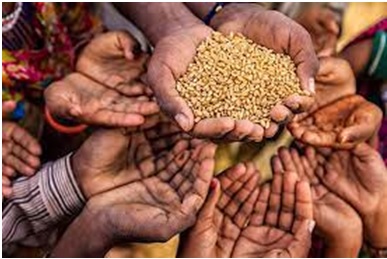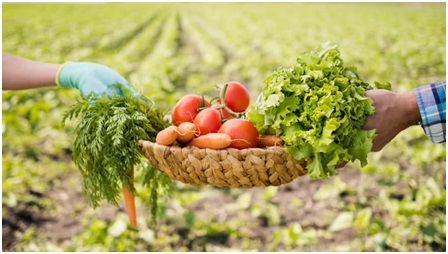Food security is a state in which all individuals have physical, social, and economic access to sufficient, safe and nutritious food to meet their dietary needs and food preferences for an active and healthy life. Simply put, food security means that people have reliable access to an adequate supply of food that is safe and meets their nutritional requirements, thus ensuring their well-being and health. It encompasses not only the availability of food but also the ability to access and afford it, as well as the utilization of that food to maintain good health.

‘’Innovations that are guided by smallholder farmers, adapted to local circumstances, and sustainable for the economy and environment will be necessary to ensure food security in the future” – Bill Gates
Food security is a fundamental human right and a crucial aspect of public health and global development. The role of farming in achieving Food security cannot be overstated. In this blog post, we will delve into the importance of farming and how it can significantly improve food security across the globe.
RELIABLE FOOD SUPPLY
Farming is the backbone of our food supply chain. The cultivation of crops and the rearing of livestock are the primary means by which we produce the food that sustains us. Without farming, there would be no consistent source of food to meet the nutritional needs of people around the world.LOCAL AND GLOBAL FOOD PRODUCTION
Farming is essential for both local and global food production. Local farming ensures that communities have access to fresh, nutritious produce, reducing the dependency on long supply chains. On a global scale, the interconnectedness of farming helps in distributing food to regions where it is needed most.ECONOMIC STABILITY
Agriculture is not just about growing food; it's also a significant economic contributor. In many countries like Nigeria, farming employs a large portion of the population and contributes to the overall economic stability. When farmers prosper, they can invest in better equipment and practices, which, in turn, leads to increased food production.DIVERSE FOOD OPTIONS
Farming allows for the cultivation of a wide variety of crops, providing diverse food options. A diversity of crops not only improves diets but also guards against dependence on a single staple food, which can lead to vulnerabilities in the food supply. For example, the cultivation of multiple types of grains, fruits, and vegetables ensures that a crop failure in one area does not lead to widespread food shortages.FOOD SECURITY IN TIMES OF CRISIS
Farming plays a crucial role in ensuring food security during crises. In times of natural disasters, economic downturns, or pandemics, having a robust farming sector is a lifeline. Locally grown food can be more accessible and reliable than imports during these challenging periods.SUSTAINABLE AGRICULTURE
Sustainable farming practices are key to long-term food security. By investing in and adopting sustainable agricultural techniques, such as organic farming, crop rotation, and conservation agriculture, we can ensure that the land remains fertile and productive for generations to come.REDUCING FOOD WASTE
Farming helps reduce food waste by producing only what is needed and preserving excess harvests for future use. Efficient farming practices and better food distribution systems can minimize losses from field to table
Farming is not just a job; it's a lifeline for humanity. The importance of farming in improving food security cannot be emphasized enough. It is the foundation upon which we build our food systems, ensuring that people have access to a consistent, diverse, and sustainable source of nourishment
At Cozance we believe that supporting and investing in farming is not only essential but also a sharedresponsibility as we work
towards a world where no one goes to bed hungry. We believe that it is a means to end global food scarcity.
Ever thought of scaling into farming? Food farming can be a complex and multifaceted endeavor, but here are several key pieces of advice for farmers looking
to expand their agricultural operations:

Remember that scaling a farming operation is important if we must end global food scarcity but it takes time, effort, and careful planning.
